Aruna
Born to Shri Kisangopalji and Vasanti devi Ruthia on April 11, 1954 in Nagpur, Aruna was the middle sibling— Chandrashekhar (1948-2017) and Anand (1956-2010) were her brothers.
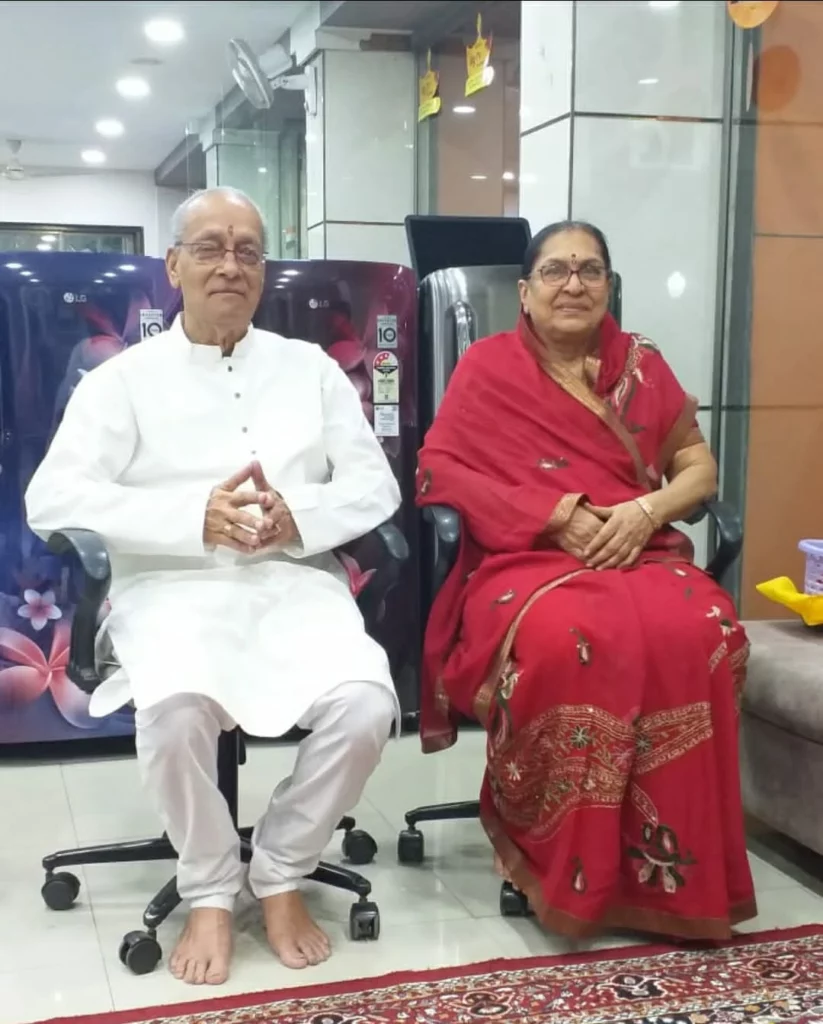
She used to live in Kirana Oli, Itwari, then a relatively sparsely populated area. She went to the Nityanand Kanya Vidyalaya, near Balaji Mandir on Dharaskar Road. “Parvata bai, a maid from our home used to escort nine girls to the school, and a watchman guarding the school gate wouldn’t let any girl go out. I did not study further because my dadi was orthodox and did not like girls going out,” Aruna Bhabhi described her education.
Om
Om was the fourth of six siblings. Like the rest of his brothers and sisters, he too was born at home- in the Marwadi Mohalla, Wardha. Asha, Ashok and Pushpa were his elder siblings; JP and SP followed him. Born on 18 March 1948—he shares his birthday with Ashwini-—he went to two schools in Wardha for education: The Nagar Parishad School for primary education and Swavalambi Vidyalaya for middle school and higher secondary education. He went to GS College of commerce where he obtained B Com in 1968. ” Those days our teachers at commerce college were Professor Shah, Wanmali, Jajoo, and Shrinarayanji Agrawal,” Om recalls.
I have faint memories of Om bhaisaab during my childhood days. He was nine-and-half years elder to me and I was the youngest in the family. So I was a pampered child. My sisters tell me that he would occasionally tease me and I would run after him, but our childhood fights would quickly come to an end.
Marriage
Aruna Bhabhi was 20 and Om 26 when they married each other. ” I was engaged on 18 April and got married the next month, on 18 May 1974. Gita bhabhi and Uttambhau—we had stopped talking with them since 1969— used to visit her father. Uttambhau was Bhaiji’s nephew and following property disputes in 1969, the uncle and the nephew broke all relationships. He with a scooter accident and was in Bhabhi’s home for almost a week. During that period, Aruna cared for him, offering him Haldi ka doodh. Her nature, care and behaviour touched his heart and he suggested to Pushpa and Jijaji who used to live at Shankar nagar in Nagpur that the girl could turn out to be a suitable bride for Om. I cannot explain what made Uttambhau propose Aruna to Kalantri family, although they were not even on talking terms. Jiji and Jijaji saw her and they too liked her. The proposal was formally moved. Her father came to Wardha to see Om and approved him. Next week, nine men and women from the Kalantri family came to see her— Professor Shri Narayan Agrawal, Bai, Bhaiji, Jiji, Jijaji, Chimni Ramji Shastri (Pundit) and a few others. The ring ceremony was performed the same day.”

Om had finished his B Com and was looking forward to settling down in life. Mr Purushottam Jhunjhunwala, managing director of Bachhraj factories, had come to Wardha. He interviewed me and told Bhaiji to train him in the Nagpur unit for a couple of months so that I can learn the cotton business. Bhaiji flatly refused saying that he does not want the son to be with the father- it is impossible. Bachhraj factories had a unit in Badnagar, a town 45 km from Ujjain in MP. He offered me a manager’s post there. Ashok was already looking after a shop, and Bhaiji wondered if Badnagar would help me settle down. He asked me to choose from the two options I had in my hand- to serve as a manager in a cotton factory or to independent business. Finally, I opted for business. Bhaiji endorsed my decision saying that all his life he has served. He wanted his son to do business.
“Just before my marriage was formally fixed, talks were going on with an engineer from Bombay. But my father preferred Wardha boy to a Bombay engineer. I cannot think of sending my daughter so far. Thus, the Bombay proposal fizzled out,” Aruna Bhabhi told me.
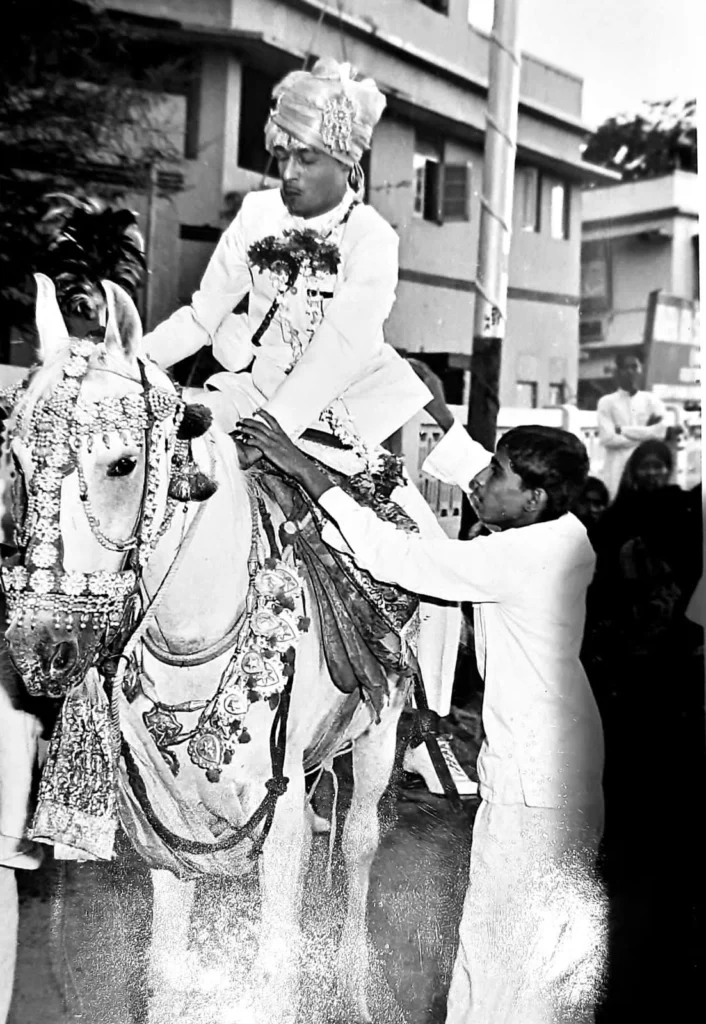
Next month, the caravan of a dozen white Ambassador cars carrying baraat arrived from Wardha. The baraatis stayed at the newly built MLA Hostel, Civil Lines, Ravi Nagar. The wedding ceremony was performed at the Dhiran Kanya Shala, Sitabuldi, Nagpur. My friend Manohar Parmar had come for the marriage. Keshavlal Patel, with who I was to develop a lifelong bond, could not come because a boy from his family was to wed the same day. The baraat procession began. A decorated white ghodi was arranged —an old Rajput tradition where the groom wins brides and takes them, riding on the horse. As the Baraat reached the Panchsheel square, the powerful mare began to jump up and down. This was the first time I was riding a horse, and my heart leaped in my mouth. I put on a brave face though and was able to control the horse.
On 19 May, a day following the wedding, Aruna came to Wardha. A reception was hosted for the newlyweds in the Jaishree Bhavan. Shyamlalji Baiswar was closely associated with Bhaiji and during the renovation of Jaishree Bhavan had accompanied Om to Nagpur, several times. His paraplegic son on the wheel chair took great pains to decorate the entire Jaishree bhavan and JPK sadan! “The house was indeed looking so beautiful,” Om recalls.
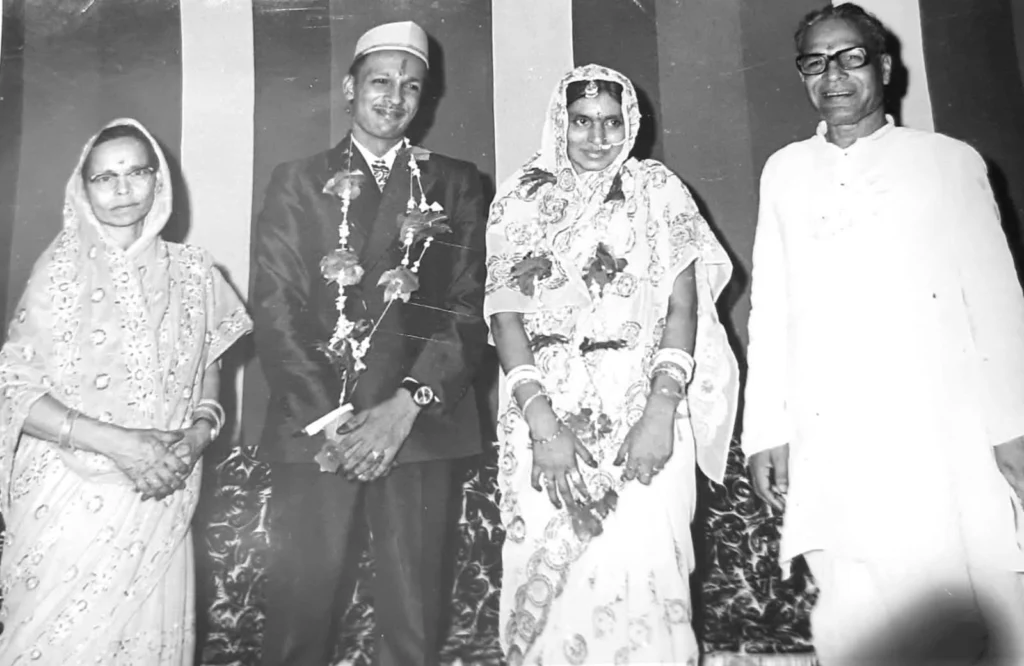
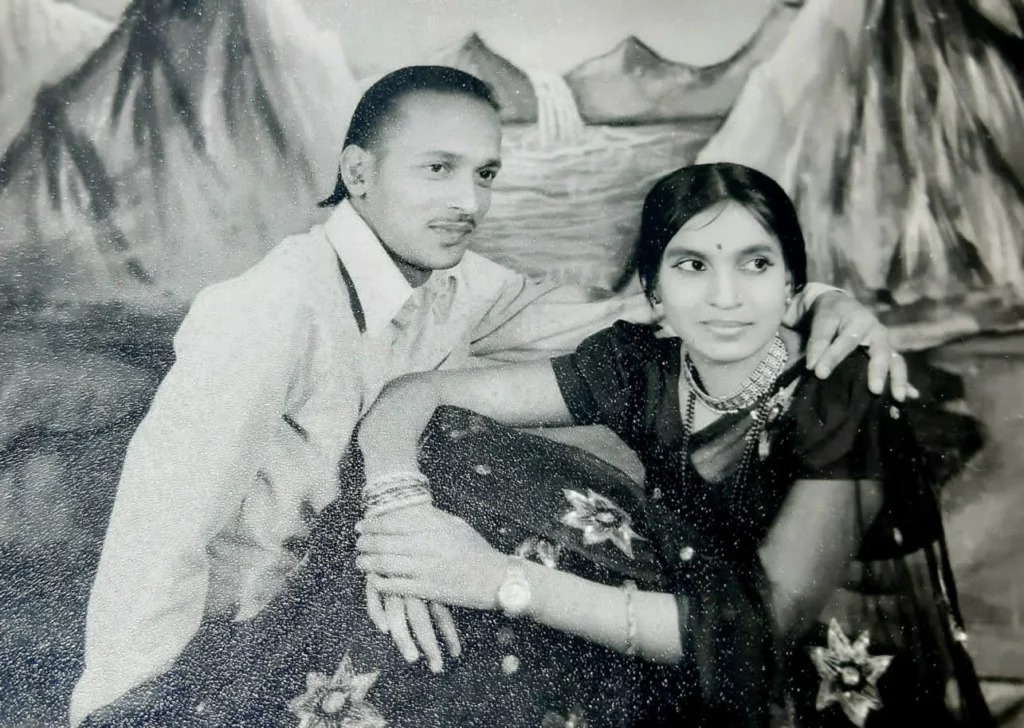
Tiger cement (1968-1970)
Shyam Rathi from Nagpur was Jijaji’s good friend. He had a distributorship of the Tiger cement for the entire Maharashtra. In 1968, Jijaji brought him to Wardha and after exchanging pleasantries he offered me the agency for Wardha and Yavatmal. My task was to sell cement. I used to drive my scooter to the construction sites in Wardha and Yavatmal and would ask builders and contractors to sample just five bags of the cement I was selling. I then began selling cement to the Wardha Nagar Parishad and Sevagram medical college. We did not own a shop but used to stock cement in the Bachhraj press and the godown behind Laxmi Narayan Mandir. Later, trucks from Raipur used to unload the cement bags on tarpaulins in the Jaishree bhavan. Later, we opened a shop in the Bachhraj press campus where we also started selling steel.
“Those days I was tight on cash. When I asked Bhaiji for the cash, the first question he would ask me was the return date. A wagon of cement bags carrying 480 bags used to cost Rs 5000 then. Bhaiji would ask the Gandhi Chowk cashier to make entries, confirm when I was going to return the amount and remind me exactly on that day to return the money. He never wanted his office to fund me for my private business,” Om recalls.
That was also a time when Jaishree bhavan and JP Sadan construction was going on. The cement for both the buildings went from our shop. Bhaiji would often wonder why I was not earning enough. Where was the money going? Was I squandering the money? he once questioned. Shyamlalji Baiswar, our engineer and family friend explained to him. ” Om is not even married. Where would he waste money? All his business profits are going for the two houses you are constructing,” he explained.
Yelakeli (1976)
Soon after graduating, he began to look after the agricultural field at Yelakeli. ” I would take just a little over 30 minutes to cycle to the village.
Raju was born in Nagpur on 31 March 1975. A year after, cracks began to develop in the joint family. We used to own a 15-acre agricultural land in Yelakeli, 10 km from Wardha that Bhaiji had purchased in 1948. In the winter of 1977, Aruna and Om went to the Yelakeli village. He lived there for a year. Shamrao Akre was our diwanji that time and he lent considerable support.
I also opened a milk dairy in Yelakeli. We used to sell milk, and milked about 8 to 10 cows and buffaloes. Every morning, the milk would go to Wardha.”
We used to sow cotton, brinjals, mirchi and vegetables. H4 was the most popular variety of cotton; Varlaxmi had just been introduced. When we grew cotton in half an acre land using Varlaxmi, people from surrounding villages would come to to see the crop. The plant would grow to a height of 8 feet! Champalalji Fattepuria from Wardha and Bhaiji used to visit us periodically and would leave, highly pleased.
The farm had a river flowing through fertile soil, a variety of flowers, plants and cows and buffaloes. We lived in a kuchha mud plastered hut with a slopping roof. A well near the home would provide fresh water. We would grow organic vegetables and it was a treat to have them in the lunches and dinners we ate.
We enjoyed our village stay to the hilt. We would wake up with birds chirping and sleep with crickets buzzing. The life was simple; the environment serene. We were so happy to raise Raju in those surroundings. He must have discovered his roots there. “Surely, I would count those days as the happiest days in my life,” says Om bhaisaab.
Bhopal (1976-78)
Next, they went to Bhopal in 1976 to work for Jijaji. “Although Bhaiji did not wish me to go, I was desperately looking for a city life. I also thought that Bhopal would give me enough opportunity to grow and prosper. I acted as a man friday for Jijaji, doing everything that he ordered. Initially he stayed with Badibai in her Kayasthpura first-floor flat for a year. Later he rented a flat in the Green Colony, Firdous Nagar, Berasia Road, Bhopal. ” The flat was beautiful, located next to the DIG bungalow. Half the salary that I used to receive would go to pay the rent. Mr Saxena, the flat-owner, was so helpful and courteous,” both Om and Bhabhi recalled.
For a year, Om didn’t take his family with him. Later Aruna Bhabhi joined him. She stayed in Bhopal for a year. The Chhola Road cast iron factory that Jijaji owned was being constructed. Jijaji asked Om to look after the factory.
At the month end, we often ran out of money. One Mr Jai Narayan, a domestic help, was also in Bhopal then. Aruna often wondered if she would cook Bhujia and ask Jai Narayan to sell it near Lily Talkies, Bhopal!
Yavatmal (1979)
Two years later, in 1979, Om came back to Yavatmal. He had developed typhoid fever in Bhopal and Bhaiji asked him to come back. He packaged all his belongings in a bus and the family moved from Bhopal to first Wardha.
On 13 November 1979, he went to Yavatmal to start a cloth shop. On 4 December 1979, he opened Aaradhana vastralaya. “How did you choose the word Aaradhana for the shop?” I asked him. ” This is an interesting question. Nobody has ever asked me the genesis of the shop,” he remarked. ” Those days, Amravati had a big cloth shop, run by Aradhana Fashions Pvt Ltd . It still is. At Jaistambh Square, Jawahar Road. I modelled my shop after that shop. Ashok was already there. He stayed with Ashok. Aruna stayed in Jaishree bhavan for three years, when Bai asked her to move to Yavatmal and to be with her husband. ” How long would you both be living alone?” Bai questioned her.
“I was a novice. I didn’t know how to run a cloth shop. I did not know how to handle a scissor. I found it challenging sell cut-pieces. For the first three months, I used to be standing all day in the shop. My legs would ache. I would get tired.”
Yavatmal Journey
Priti was born on 18 July 1980. Like Rajesh, she too was born in Nagpur.
To begin with, in 1982, we stayed near Lala Building, Vidarbha Housing Society, Awdhut wadi. The house was small and lacked a toilet. We had to endure a shared toilet. Bhaiji didn’t like this at all and wanted me to change the home. One night he stayed with us and saw bats in the home. “You must change the home quickly,” he almost ordered us. We stayed in this home for seven years.
In 1989, we bought a first-floor 650 square feet flat in the Ganpati Apartment in Awdhut wadi for Rs 1.4 lakhs where we stayed for 28 years. In December 1986, we were about to buy a new flat for 5.60 lakhs. Bhaiji had expressed a desire to fund the house but he passed away barely three days before the flat could be booked. It took us almost three decades before we could move out to the present home—in 2018.
In 2018, we found a third, more spacious and airy home—in front of the postal ground. In 2004 we bought the 4350 sqft plot from Vitthal Shrikant Lokhande and four others. Priti used to cycle areas near postal ground and one day she spotted the plot. ” Let us build a home on this plot,” she said. We constructed the shop within two years and got it inaugurated from Madan Yerawar. We named it Shree Balaji Enterprises—Lord Balaji is Aruna’s favourite God. Aruna also said that she wants the shop on the ground floor and residence on the first floor. We moved to this home in 2018.
In 1984 and 1985, Om also stocked and sold sarki from the godown in Jaishree Bhavan. The business lasted two years. He would bring the cloth from Yavatmal and would prepare 6 kg bags to sell the 1007 variety sarki. The season would last for three months. We used to hire a dozen women for sorting the seeds and filling the bags.
Preeti went to Anglo Hindi high school, Yavatmal for her entire school education. Raju went to Balmandir, Maganwadi, Wardha for primary school education between 1981 and 1982, and moved to Anglo Hindi School Yavatmal for his further school education. He did science from Anglo Hindi Junior College Yavatmal in 1993 and graduated in commerce from Amolakchand Mahavidyalaya, Yavatmal in 1996.
Rajesh fell in love with Ruchi and married her on 7 April 2000. Preeti married Manish Maheshwari on 13 February 2005. I had gone to Berkeley, USA for a year in 2004 and therefore was not able to attend her wedding.
Aruna Bhabhi recalls an incident
In the mid-seventies and early eighties, Bhaiji intermittently worked at the Bachhraj factories, Nagpur. Whenever he would come to Nagpur, he would call Chandu babu, Bhabhiji’s brother, to the Bachhraj factory. Chandu babu was young, smart, business savvy, articulate and well-mannered. Bhaiji instantly liked him. Those days, married women were not allowed to travel alone. Chandu babu would always escort Aruna to drop her to Wardha. Once Aruna Bhabhi was in her Peeher and was planning to leave for her Sasural. Chandu babu told Bhaiji that he needs to go to Wardha to drop Aruna. Bhaiji said that he was going to Wardha the next day and would spare him the trouble of dropping his sister. He would gladly take Aruna to Wardha. When Aruna got to learn that she would be travelling with her father-in-law, she felt very embarrassed. “How can I sit next to my father-in-law for two hours on the bus?” she began to wonder. Bhaiji could sense her unease. ” Don’t worry. And learn to shed such inhibitions. Had there been another unknown man sitting next to you on the bus, wouldn’t you have travelled?” he questioned her. Thus, both took a bus for Wardha from the Nagpur bus stand and arrived at the Wardha bus station. Bhaiji then hired a cycle rickshaw and the father-in-law and the daughter-in-law sat together in the rickshaw. “Don’t tell at home that we came together in the rickshaw,” Bhaiji said comically as he alighted from the rickshaw.
Raju narrates how Shree Balaji Enterprises was born
I have two persons who stood by me and greatly supported me, all my life. For health I would always fall back on SP chacha. And for wealth, I would always consult Mr Praveen Gandhi (professionally a chartered accountant, introduced to my father by Amit Singhi) and he never let me down. Ever sense we started this business, he must have accompanied us for the bank loans no less than fifty to sixty times. Whenever we ran into a problem, he would ask us to relax and pass on all our financial worries to him. Whenever my father went to his office he would treat him with respect. But for him, we would not have been able to venture in the new white good business.
Thirty years back, I had no interest in the clothes shop. I found it boring. I tried my hand at repairing and selling tape recorders. I rented a small shop where we began selling coolers to the government agencies. TV and fridge followed. The business picked up. In 2000, I was finally able to convince my father that we need to close Aaradhana. In 1995, I had stated a small white goods business and became confident that if we upscale it, we would make good money.
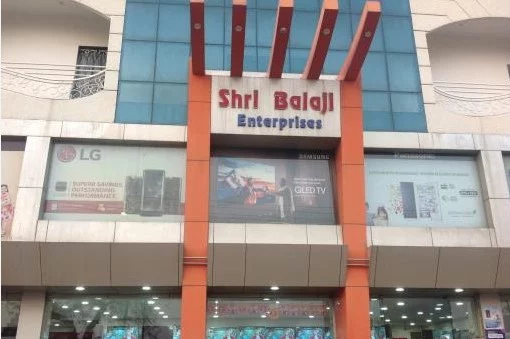
When we toyed with the idea of opening white goods shop—electronics and home appliances— at Yavatmal, we needed funds to start the business. We applied, and personally visited several banks in Yavatmal to get the loan. Finally, the State Bank of India agreed to fund our business. We had procured a loan for 15 years, but my father paid it off in just six years. Often, within a day, he would send me to the bank three times a day to repay the loan. Every penny counts, and we need to get rid of the loans quickly as we could,” he once explained to me why he was making me go to the bank so often. In childhood, he used to make me fill the LIC policy or fill the bank vouchers. This would eventually help you how to look at details, talk to the bank cashiers and boost your confidence,” he explained.
When we decided to shift our business focus from cloth to white goods, we did a bit of survey. We went to the biggest white goods seller in Yavatmal, Mr Jain. He discouraged us from doing the business. “There is no money in TV now, nor any scope in Yavatmal. I am closing it down,” he said.
I chose not to get disheartened. For the next five years, I faced intense business rivalry and I thrived on that. I worked very hard, often coming home as late as 2 am after preparing posters, banners and ensuring that our full page ad arrived on the front page of the local newspaper. I was able to convince the government officers and get their approval on the tenders. I sold almost everything that time – umbrellas, oil tins, books, and stationary!
Mr AK Gandhi (Nagpur) greatly supported us in our new venture. AK Gandhi Marketing Private Limited was a big name in Vidarbha. A leading LED TV leader, he was very polite and friendly to us. My father went to Nagpur to seek his appointment for the inauguration ceremony of our newly built showroom. He promptly granted one and agreed to grace the occasion. When he visited our new shop he spent a couple of hours with us and was pleased to see us progress. He gave us tips and tricks to succeed in this intensely competitive business. He ordered his office staff to deliver LG TVs whenever we ordered, and not to insist for money at the time of order. He passed away on March 12, 2022, a personal loss to us.
“Mr Jain did not lose the business. In fact, on 17 January 2005, he launched a bigger Jain TV Center at Azad Maidan Road in Yavatmal. He became very competitive. I love competitions. We opened our showroom a year later, on 18 January 2006. Our showroom became the talk of the town. People would come from all walks of life to have a look at our shop. Jyoti Kalantri, our Bhabhi, invested a lot of time and energy to beautify our showroom. Everybody who would come to us, would be all eyes to the beauty our showroom displayed. It was so beautifully designed and decorated!”
We soon earned a big name as the leading home appliance LG dealer. We stocked and sold electronic goods, AC, RO water purifier, LED TV, water Purifier, refrigerator, TV and much more. We gave them more than they expected.
Over the last two decades, my commercial success has only reinforced my belief in God. If you ask a favour to God with the right intentions, he always listens to you. This is the very reason why I so frequently visit Lord Balaji temple at Tirupati,” Raju explained.
” I have struggled all my life. I sold cement. I lived in a village and tended the crops. I went to Bhopal and handled the cast iron factory. I marketed Sarki. I started a cloth shop and two decades later switched to white goods. I also bought and sold some plots in between,” says Om as he looks at his life journey.
At the end of the day, struggles are inevitable and there is nothing in life you can do to stop them. We have to struggle in all walks of life, whether we like it not. However, as Raju also says, struggle and competition and business rivalry is what makes the life more rewarding. I loved challenges and fought hard to overcome them. In achieving success, the struggle is what makes accomplishing your business goals more worthwhile,” said Rajesh over a hour-long late telephonic talk I had with Aruna Bhabhi, Om Bhaisaab and Rajesh.
Aruna bhabhi and Om bhaisaab shower all their love and affection for Ruchi and Raju as well as on Preeti and Manish. Grandparents of three lovely grandchildren: Abhishek, Niharika and Pranav, they are in their thoughts all the while. Manish comes as afar as Hanumangarh in Rajasthan but is so near and dear to their heart. ‘We are so lucky to have such a son-in-law who is more than a son to us,” bhabhiji says. Pune, where Preeti and Manish live, is their extended home. Whenever they can snatch some time they make it a point to spend days with Preeti and Manish. And Ruchi blends so well her Marathi background with Marwadi culture.
Emotionally attached to both sisters, he never forgets calling them every week and shares with them his feelings, his achievements, his plans and his thoughts. His eyes visibly tear whenever he finds his sister in pain. What more can a sister ask for?
Om Bhaisaab’s spontaneous laughter is unforgettable. His big smile and hearty laughter can lighten any situation. Although he is not a doctor, he believes in the adage, “laughter is the best medicine.” And as a physician I fully agree with him!